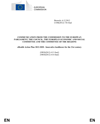
Plan targets five key areas:
- Awareness and skills, to make better use of eHealth;
- Proactive patient management of personal health;
- Improved interoperability of different healthcare systems;
- A clearer legal framework;
- Support for eHealth start-up businesses, including free legal advice and funding.
Studies show that eHealth can have significant economic advantages: in Italy alone the introduction of digital technologies in the health sector is estimated to save over €12 billion. It also has the potential to significantly reduce the number of unnecessary medical appointments and hospital stays.
"eHealth brings healthcare closer to people," said Commissioner Tonio Borg, who presented the proposals alongside Neelie Kroes, Commission Vice-President responsible for the Digital Agenda. "The Action Plan will help turn the eHealth potential into better care for our citizens."
Download: Boosting eHealth: New EU Action Plan (.pdf, 114 KB).
Download from eHealthNews.eu Portal's mirror: Boosting eHealth: New EU Action Plan (.pdf, 114 KB).